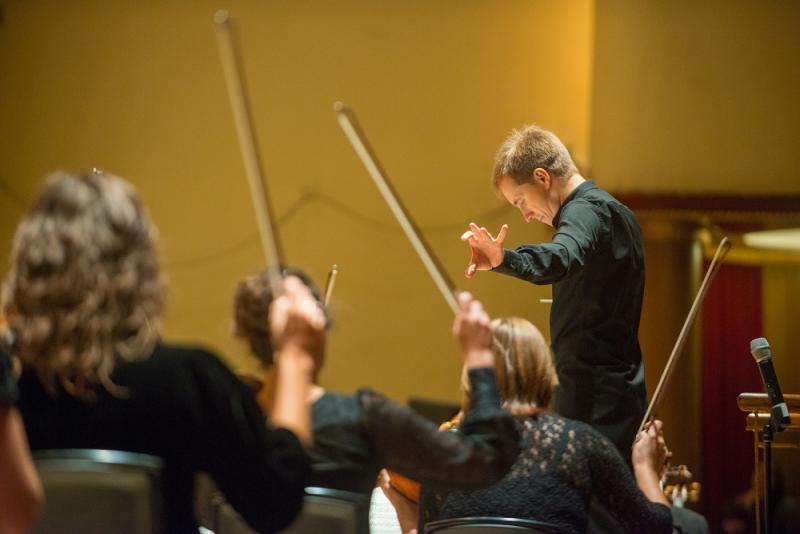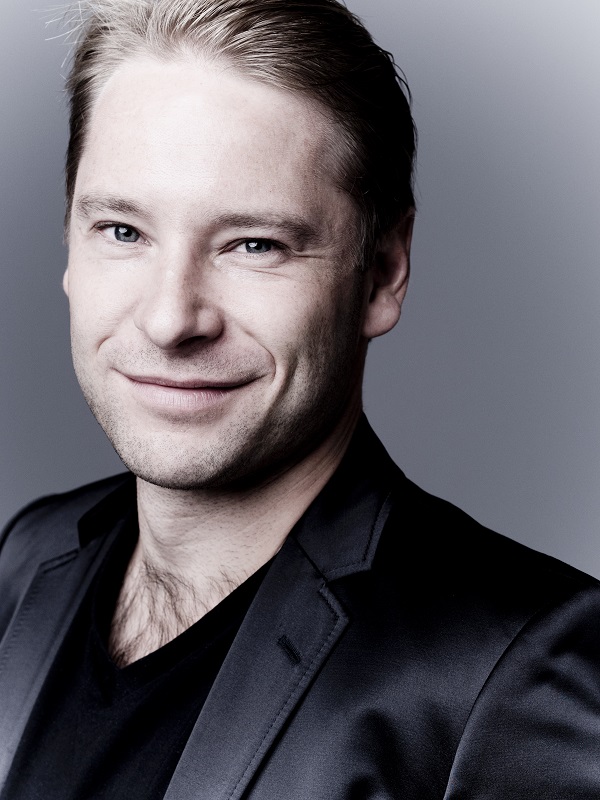Beethoven Ninth, RLPO, Petrenko, Philharmonic Hall, Liverpool | reviews, news & interviews
Beethoven Ninth, RLPO, Petrenko, Philharmonic Hall, Liverpool
Beethoven Ninth, RLPO, Petrenko, Philharmonic Hall, Liverpool
Standing ovation ends series of all nine Beethoven symphonies

The new season at the Royal Liverpool Philharmonic is focusing on revolutionaries. Bach, Beethoven and Berlioz all feature strongly over the next few months, as will Stravinsky and – where else but Liverpool? – The Beatles.
The RLPO has another reason to celebrate, too. It’s 10 years since Vasily Petrenko took up the baton as chief conductor of the orchestra and much has changed in that decade, not least the edgily confident way in which Petrenko and the RLPO explore the repertoire. The start of the 11th season with Petrenko at the helm presented audiences with something of a marathon: all nine Beethoven symphonies along with his Violin Concerto (with James Ehnes as soloist: he’s the new artist-in-residence), all served up with side orders of Berlioz and Mendelssohn.
The cycle of symphonies closed with the Ninth (“Choral”) Symphony. The fact that tickets were sold out almost goes without saying, but to see a packed house leap to its feet almost as one at the end of the work is, indeed, unusual. It’s not difficult to see why: Petrenko, ever in control, made sure the drama of the first movement was played out to maximum effect. The phrasing was pointed, to the extent of almost being brusque. A breathless Molto Vivace second movement felt equally dramatic, especially the barely perceptible string pianissimos which Petrenko allowed to build into explosive climaxes.
 Possibly the most memorable part of this entire performance was the serene, relaxed, perfectly shaped slow movement. There really was something other-worldly about it: "languorous" is too harsh a word, while "relaxed" is not right either. But the feeling of being transported somewhere else was certainly there. This was the movement where the woodwind chorus really came into its own and the strings played with considerable precision.
Possibly the most memorable part of this entire performance was the serene, relaxed, perfectly shaped slow movement. There really was something other-worldly about it: "languorous" is too harsh a word, while "relaxed" is not right either. But the feeling of being transported somewhere else was certainly there. This was the movement where the woodwind chorus really came into its own and the strings played with considerable precision.
And then that finale. Again, it was controlled: neither too fast nor too slow, well balanced with the orchestra accompanying the Royal Liverpool Philharmonic Chorus rather than overpowering. The chorus, singing without scores, showed how well-drilled they were as far as diction was concerned, and they managed to bring off the vocal parts without any feeling of strain or stress. Bass-baritone Konstantin Wolff (pictured above by Marco Borggreve) was particularly striking, singing out with authority. The same could be said for mezzo-soprano Anna Stéphany, though tenor Timothy Robinson and soprano Veronika Dzhioeva were slightly less convincing.
Stéphany was soloist in Berlioz’s Le nuits d’été. This song cycle always seems hard to bring off for a soloist, yet this was a beautiful, rather subdued performance. It didn’t really open that well: the first few moments felt somewhat lifeless, despite the sensitive playing of the woodwind. But the soloist quickly settled, effortlessly singing through the rather morbid and forbidding songs until the finale brought some relief. The Lamento, “Sur les lagunes”, was ponderous as well as heart-breaking Despite the initial misgivings, this turned into a polished performance.
rating
Share this article
The future of Arts Journalism
You can stop theartsdesk.com closing!
We urgently need financing to survive. Our fundraising drive has thus far raised £49,000 but we need to reach £100,000 or we will be forced to close. Please contribute here: https://gofund.me/c3f6033d
And if you can forward this information to anyone who might assist, we’d be grateful.

Subscribe to theartsdesk.com
Thank you for continuing to read our work on theartsdesk.com. For unlimited access to every article in its entirety, including our archive of more than 15,000 pieces, we're asking for £5 per month or £40 per year. We feel it's a very good deal, and hope you do too.
To take a subscription now simply click here.
And if you're looking for that extra gift for a friend or family member, why not treat them to a theartsdesk.com gift subscription?
more Classical music
 Kaploukhii, Greenwich Chamber Orchestra, Cutts, St James's Piccadilly review - promising young pianist
A robust and assertive Beethoven concerto suggests a player to follow
Kaploukhii, Greenwich Chamber Orchestra, Cutts, St James's Piccadilly review - promising young pianist
A robust and assertive Beethoven concerto suggests a player to follow
 Robin Holloway: Music's Odyssey review - lessons in composition
Broad and idiosyncratic survey of classical music is insightful but slightly indigestible
Robin Holloway: Music's Odyssey review - lessons in composition
Broad and idiosyncratic survey of classical music is insightful but slightly indigestible
 Classical CDs: Wolf-pelts, clowns and social realism
British ballet scores, 19th century cello works and contemporary piano etudes
Classical CDs: Wolf-pelts, clowns and social realism
British ballet scores, 19th century cello works and contemporary piano etudes
 Bizet in 150th anniversary year: rich and rare French offerings from Palazzetto Bru Zane
Specialists in French romantic music unveil a treasure trove both live and on disc
Bizet in 150th anniversary year: rich and rare French offerings from Palazzetto Bru Zane
Specialists in French romantic music unveil a treasure trove both live and on disc
 Scottish Chamber Orchestra, Ibragimova, Queen’s Hall, Edinburgh review - rarities, novelties and drumrolls
A pity the SCO didn't pick a better showcase for a shining guest artist
Scottish Chamber Orchestra, Ibragimova, Queen’s Hall, Edinburgh review - rarities, novelties and drumrolls
A pity the SCO didn't pick a better showcase for a shining guest artist
 Kilsby, Parkes, Sinfonia of London, Wilson, Barbican review - string things zing and sing in expert hands
British masterpieces for strings plus other-worldly tenor and horn - and a muscular rarity
Kilsby, Parkes, Sinfonia of London, Wilson, Barbican review - string things zing and sing in expert hands
British masterpieces for strings plus other-worldly tenor and horn - and a muscular rarity
 From Historical to Hip-Hop, Classically Black Music Festival, Kings Place review - a cluster of impressive stars for the future
From quasi-Mozartian elegance to the gritty humour of a kitchen inspection
From Historical to Hip-Hop, Classically Black Music Festival, Kings Place review - a cluster of impressive stars for the future
From quasi-Mozartian elegance to the gritty humour of a kitchen inspection
 Shibe, LSO, Adès, Barbican review - gaudy and glorious new music alongside serene Sibelius
Adès’s passion makes persuasive case for the music he loves, both new and old
Shibe, LSO, Adès, Barbican review - gaudy and glorious new music alongside serene Sibelius
Adès’s passion makes persuasive case for the music he loves, both new and old
 Anja Mittermüller, Richard Fu, Wigmore Hall review - a glorious hall debut
The Austrian mezzo shines - at the age of 22
Anja Mittermüller, Richard Fu, Wigmore Hall review - a glorious hall debut
The Austrian mezzo shines - at the age of 22
 First Person: clarinettist Oliver Pashley on the new horizons of The Hermes Experiment's latest album
Compositions by members of this unusual quartet feature for the first time
First Person: clarinettist Oliver Pashley on the new horizons of The Hermes Experiment's latest album
Compositions by members of this unusual quartet feature for the first time
 Gesualdo Passione, Les Arts Florissants, Amala Dior Company, Barbican review - inspired collaboration excavates the music's humanity
At times it was like watching an anarchic religious procession
Gesualdo Passione, Les Arts Florissants, Amala Dior Company, Barbican review - inspired collaboration excavates the music's humanity
At times it was like watching an anarchic religious procession

Add comment